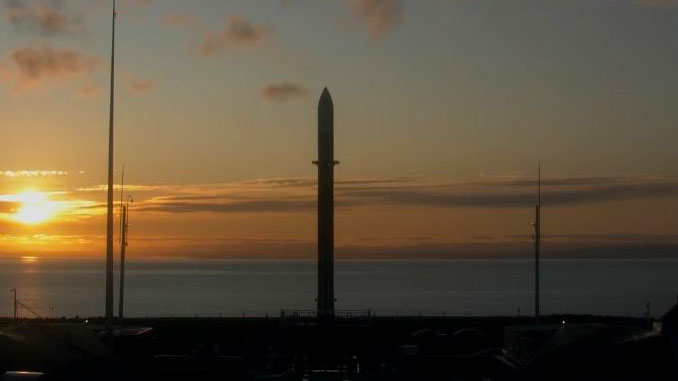Space News & Blog Articles
Rocket Lab’s 40th Electron rocket readied for second launch attempt
 Rocket Lab’s 40th Electron rocket stands ready for launch on LC-1B, a the Mahia Peninsula, New Zealand. Image: Rocket Lab.
Rocket Lab’s 40th Electron rocket stands ready for launch on LC-1B, a the Mahia Peninsula, New Zealand. Image: Rocket Lab.
Rocket Lab will make another attempt to launch its 40th Electron rocket Sunday after a last-second abort on July 30. The small satellite launcher, carrying a radar-imaging satellite, is scheduled to liftoff from the Mahia Peninsula, New Zealand, during a launch window that runs from 0500-0700 UTC (1-3 a.m. EDT/5-7pm NZST).
Electron’s payload, Acadia 1, is the first of four new radar-imaging satellites for Earth observation company, Capella Space. The mission is named “We Love the Nightlife” for the satellite’s ability to make observations day and night.
These Synthetic Aperture Radar (SAR) Earth-imaging satellites are the third generation of satellites for Capella Space. The company said this next generation is designed to “expand the existing Capella constellation to provide highest quality imagery, best ground-range resolution, and the fastest order-to-delivery speeds available from any commercial SAR provider.”
Here's a replay of the moment the Electron rocket launch was aborted. pic.twitter.com/cNbGYiq16E
— Spaceflight Now (@SpaceflightNow) July 30, 2023
The previous launch attempt on July 30 was aborted after engine ignition just moments before liftoff. Rocket Lab founder and Chief Executive Peter Beck said one of the automatic abort was triggered when one of Electron’s nine Rutherford engines reported a low igniter pressure.
“Its not uncommon to see low pressures now and again, we just have not seen it lead to an abort for a while,” he wrote in a Tweet. “My bet is a tricky pressure transducer.”
Strong winds at the rocket’s launch site on the east coast of New Zealand’s North Island forced a further delay in the rescheduled launch.
It will be the 40th launch of the Rocket Lab’s Electron rocket since it first flew in May 2017. Acadia 1 will be the 171st satellite the rocket has carried.
When you subscribe to the SpaceZE News Feed, we will send you an e-mail when there are new updates on the site so you wouldn't miss them.

